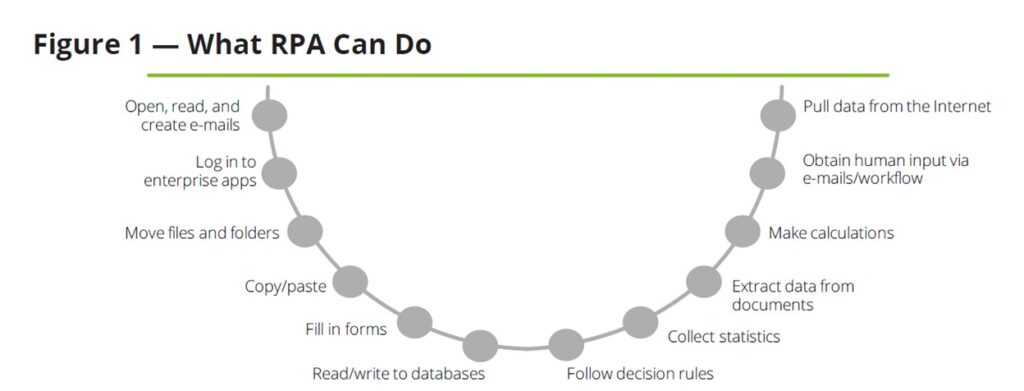Deploying RPA in Revenue Cycle Management is a Game-changer to Achieving More Efficient Financial and Clinical Processes
Robotics Process Automation (RPA) has come a long way since its introduction in the 1990s as a way to automate the testing of user interfaces.[1] Today, the technology is being used in thousands of organizations around the world for a myriad of applications. Nearly every sector has experienced some form of RPA deployment—a trend that is expected to grow exponentially. In North America alone, the RPA market is anticipated to grow 37.6% between 2022 and 2030.[2]
Healthcare presents a great opportunity for the use of robotic process automation, especially in its ability to streamline administrative processes by eliminating time-consuming, error-prone, manual processes. McKinsey reports that “Of the nearly $4 trillion spent on healthcare annually in the United States, administrative spending is about one-quarter of the total.”[3] The potential for RPA is especially applicable for revenue cycle management, which wastes billions each year in administrative inefficiencies.[4]
What is Robotic Process Automation?
According to a definition provided by Revenue Cycle Intelligence, “Robotic process automation is an automation technology that mimics human behavior for rule-based tasks to complete transactional and repetitive processes. A set of scripted processes can access applications and data sources using structured data and logic to automate decisions according to predefined business rules and conditions.” From there “bots” are used “to ensure the completion of predictable, repetitive tasks without the need for human intervention.”[5] Because transactional and repetitive processes are widespread in the healthcare revenue cycle, leveraging RPA here can bring significantly greater efficiencies.
According to Deloitte’s assessment on RPA[6], key processes are prime use cases for RPA when they require:
- a high degree of accuracy and consistency
- repetitive and manual transaction processing
- information gathered from fragmented systems
- dependency on data entry, data manipulation, and report generation
As bots exactly follow prescribed procedures, they can bring increased compliance and cost efficiencies to routine tasks. Examples of repetitive tasks in a process that RPA can perform are below:[7]

Key benefits
As Deloitte describes further, robotic process automation can bring both financial and non-financial benefits to business processes of all kinds:
- Speed Increase: Reduce turn-around time
- Cost Reduction: Reduce cost through automating activities and requiring fewer full-time equivalents
- Quality: Increase quality by avoiding human error
- Talent: Boost employee engagement by shifting personnel to more interesting tasks
- Scalability: Increased capacity without long build-up phase
- Operations: Nonstop performance
- Decision Making: Provide the inputs needed to improve decision making
- Quality Control: Reduce or eliminate potential for unintentional or intentional human error
Intelligent Automation Barriers and opportunities
It can be challenging for health systems to implement intelligent automation solutions like RPA, especially those utilizing multiple patient accounting systems and technologies throughout the enterprise. Revenue cycle leaders must understand which revenue cycle processes stand to gain the most value from RPA applications, select the best solutions, recruit trained resources to develop and deploy the applications, and secure the resources needed to purchase and implement the applications. This could be why a 2021 survey by HFMA found that a third of hospitals did not yet employ automation solutions for the revenue cycle, despite all the efficiencies that an investment in RPA would gain.[8]
A great way to take advantage of all that RPA has to offer, but without the heavy burden of recruiting, implementation, and costs, is to partner with a revenue cycle expert that already has invested in the expertise and technology needed to leverage RPA tools throughout revenue cycle processes. Health systems can gain all the benefits RPA has to offer from the very first day, without having to wait for sourcing, approvals, recruiting and implementation if they choose to do it themselves.
Selecting a Partner for RPA in Healthcare
First and foremost, it’s important to find a partner that deploys RPA tools throughout the revenue cycle, not just here and there. Core healthcare revenue cycle processes that can reduce administrative burdens by leveraging RPA include:
- Capturing and entering patient demographic data
- Reducing claim denials
- Automating claims submission or adjudication
- Checking claims status
- Verifying eligibility and benefits
- Securing prior authorizations
- Coding and entering charges
- Auditing charges for compliance
- Posting and reconciling payments
- Posting notes to accounts receivable
The best partners are those that take a “bots first” approach to identifying the most valuable automation opportunities in each health system’s unique ecosystem. They should also have extensive domain expertise and a record of employing innovative technologies in forward-thinking ways.
Omega Healthcare: UiPath Automation Excellence Award
At Omega Healthcare, we know that deploying automation and RPA is a game-changer to achieving faster, more accurate and more efficient financial and clinical processes. Our clients directly benefit from our use of automation and technology throughout our end-to-end revenue cycle service offerings. We’ve recruited and trained highly experienced professionals in the art of reducing waste and inefficiency in healthcare processes via purpose-built automation. We provide services to our clients on their own software and can create custom bots designed to improve a healthcare provider’s unique business processes.
We recently were awarded a UiPath Automation Excellence Award for Special Recognition in Process Automation, as well as the Artificial Intelligence Excellence Award at the 10th BPO Innovation Summit. The UiPath Automation Excellence Awards aim to recognize and celebrate the game changers of Automation in various categories. UiPath gave the award in the category of Industry-specific Process Automation: Healthcare to Omega Healthcare, demonstrating our investment in RPA and automation. The Artificial Intelligence Excellence Award recognized Omega Healthcare for leveraging advanced technologies like artificial intelligence (AI) and machine learning (ML) models to solve real-world problems.
Success story
A leading healthcare technology company that processes more than $1 trillion in healthcare claims each year needed help managing its EOB processes. The company, which partners with 900,000 providers, 33,000 pharmacies, 600 labs, and more than 5,000 hospitals across the U.S., needed to improve efficiency and accuracy in order to be paid on time and in full. They found that an ineffective EOB management process can cause:
- Increased likelihood of errors that lead to HIPAA violations and penalties
- Resource-intensive review and audit processes, especially for those with high volumes
- Increased inefficiencies and delays due to a lack of accurate reporting and alert mechanisms
- Difficulty monitoring hourly productivity against established targets
The company chose to partner with Omega Healthcare for the management of its entire EOB process. The solution was customized to accommodate the company’s unique needs and workflows, which included:
- Developing BOTs via RPA with safety checks at all levels of execution
- Validating file names
- Checking destination host name
- Securing credential management
- Post-uploading accuracy checks
- Providing detailed reporting
With Omega Healthcare providing robotic process automation services and solutions, the company was able to reduce manual processes and achieve more effective, accurate management of EOBs, so they could in turn provide the highest level of service to their provider, pharmacy, lab, and hospital customers.
Other results included
- 5,000 file uploads per day
- 70% improvement in turn-around times and overall reduction in average handling time
- 100% HIPAA compliance
- Enhanced risk mitigation
- Re-deployment of workforce for higher value tasks
A better approach
Automation technologies are meant to identify and reduce waste and inefficiencies. Ironically, they can end up being complex, cumbersome, and costly solutions for organizations to manage and use to their full potential. Omega Healthcare can help. Our team of intelligent automation and RPA experts have developed more than 1,000 bots designed specifically for automating repetitive healthcare tasks and have focused on automating areas throughout the entire revenue cycle. By partnering with revenue cycle experts like Omega Healthcare, healthcare companies and health systems can gain all the benefits of RPA faster, cheaper, and without the heavy lift.
[1] “RPA: From UI testing to enterprise and RPA-as-a-service,” ElectroNeek History of RPA, website page accessed August 2022
[2] “Robotic Process Automation Market Size Report, 2030.” Grandview Research, overview report accessed August 2022
[3] “Administrative simplification: How to save a quarter-trillion dollars in US healthcare,” Executive Briefing, McKinsey & Company, October 20, 2021
[4] “2021 CAQH Index, Working Together: Advances in Automation During Unprecedented Times,” CAQH Explorations, 2022
[5] “High-Impact Robotic Process Automation Use Cases for the Revenue Cycle,” RevCycle Intelligence, February 21, 2022
[6] “Robotic Process Automation,” Deloitte, September 2018
[7] Ibid.
[8] ”Third of Hospitals, Systems Don’t Use Revenue Cycle Automation,” Jacqueline LaPointe, RevCycle Intelligence, April 14, 2021.





